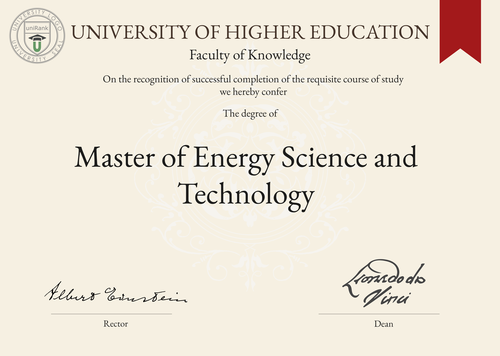
Master of Energy Science and Technology (MEST)
Guide to Master of Energy Science and Technology Program/Course/Degree
Master of Energy Science and Technology (MEST)

Program Name:
Master of Energy Science and TechnologyProgram or Degree abbreviation:
MESTDuration range:
The duration of the program typically ranges from 1 to 2 years.Tuition range:
The tuition fees for the program vary depending on the chosen country and university. Please refer to the respective university websites for specific information.Overview:
The Master of Energy Science and Technology program is designed to provide students with a comprehensive understanding of the energy sector, including renewable energy sources, energy management and sustainable technologies. The program equips students with the knowledge and skills necessary to address the global energy challenges and contribute to the development of sustainable energy solutions.Curriculum Overview by year:
The curriculum is structured to cover various aspects of energy science and technology. In the first year, students typically study foundational courses such as energy systems, energy economics and energy policy. The second year focuses on specialized courses related to specific areas of energy, such as renewable energy technologies, energy efficiency and energy storage.Key Components:
The key components of the program include theoretical knowledge, practical skills and research experience. Students gain a deep understanding of energy systems, technologies and policies through a combination of lectures, laboratory work and research projects. The program also emphasizes the development of critical thinking, problem-solving and communication skills.Career Prospects:
Graduates of the Master of Energy Science and Technology program have diverse career opportunities in the energy sector. They can work in renewable energy companies, energy consulting firms, government agencies, research institutions and international organizations. Potential job roles include energy analyst, sustainability consultant, energy project manager, policy advisor and research scientist.Salary Expectations:
Salary expectations for graduates of the program can vary depending on factors such as location, industry and job position. Generally, professionals in the energy sector earn competitive salaries, with potential for growth as they gain experience and expertise. For a more accurate understanding of salary expectations, you can utilize the Job Sites Search Engine, from our sister site jobRank, which searches over 4,600 job sites worldwide. Make sure to specify not only the job title but also the country you are interested in.Conclusions:
It is important to note that the duration, tuition fees, curriculum, key components, career prospects and salary expectations of the Master of Energy Science and Technology program can vary based on the chosen country or location for studying the program, as well as the chosen university. Prospective students are advised to research and compare different universities and countries to find the best fit for their academic and career goals. Visitors can search for where this specific degree (MEST) is offered anywhere in the world through the uniRank World Universities Search Engine, which provides comprehensive information on universities and their programs worldwide.World Universities Search Engine
search for Master of Energy Science and Technology (MEST) and add the Location (country, state etc.) or specific University you are interested in studying at.
Query examples:
- Master of Energy Science and Technology (MEST) United States
- Master of Energy Science and Technology (MEST) United Kingdom online
- Master of Energy Science and Technology (MEST) Australia international students
- Master of Energy Science and Technology (MEST) University of California
- Master of Energy Science and Technology (MEST) University of London tuition fees
- Master of Energy Science and Technology (MEST) University of Sydney scholarships
Share Program/Course
Interesting? Share this program/course/degree info with your friends now.